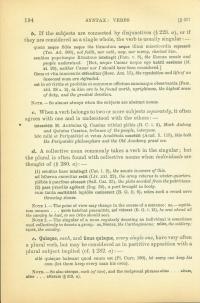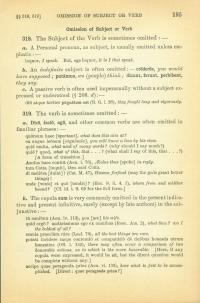Agreement of Verb and Subject
316. A finite verb agrees with its subject in number and person.
Ego statuō.
I resolve.
Senātus dēcrēvit.
The senate ordered.
Silent lēgēs inter arma. (Mil. 11)
The laws are silent in time of war.
Note— In verb forms containing a participle, the participle agrees with the subject in gender and number (§ 286).
Ōrātiō est habita.
The plea was delivered.
Bellum exortum est.
A war arose.
a. A verb having a relative as its subject takes the person of the expressed or implied antecedent.
Adsum quī fēcī. (Aen. 9.427)
Here am I who did it.
Tū, quī scīs, omnem dīligentiam adhibēbis. (Att. 5.2.3)
You, who know, will use all diligence.
Vidēte quam dēspiciāmur omnēs quī sumus ē mūnicipiīs. (Phil. 3.15)
See how all of us are scorned who are from the free towns.
b. A verb sometimes agrees in number (and a participle in the verb form in number and gender) with an appositive or predicate noun.
Amantium īrae amōris integrātiō est. (Ter. And. 555)
The quarrels of lovers are the renewal of love.
Nōn omnis error stultitia dīcenda est. (Div. 2.90)
Not every error should be called folly.
Corinthus lūmen Graeciae exstīnctum est. (cf. Manil. 11)
Corinth, the light of Greece, is put out.
Double or Collective Subject
317. Two or more singular subjects take a verb in the plural.
Pater et avus mortuī sunt.
His father and grandfather are dead.
Note— So rarely (by synesis, § 280.a) when an Ablative with cum is attached to a singular subject.
Dux cum aliquot prīncipibus capiuntur. (Liv. 21.60)
The general and several leading men are taken.
a. When subjects are of different persons, the verb is usually in the 1st person rather than the 2nd, and in the 2nd rather than the 3rd.
Sī tū et Tullia valētis ego et Cicerō valēmus (Fam. 14.5)
If you and Tullia are well, Cicero and I are well.
[Notice that the 1st person is also first in order, not last, as by courtesy in English.]
Note— In case of different genders a participle in a verb-form follows the rule for predicate adjectives (see § 287.2-4).
b. If the subjects are connected by disjunctives (§ 223.a), or if they are considered as a single whole, the verb is usually singular.
Quem neque fidēs neque iūs iūrandum neque illum misericordia repressit. (Ter. Ad. 306)
Not faith, nor oath, nay, nor mercy, checked him.
Senātus populusque Rōmānus intellegit. (Fam. 5.8)
The Roman senate and people understand.
BUT
Neque Caesar neque ego habitī essēmus. (id. 11.20)
Neither Cæsar nor I should have been considered.
Fāma et vīta innocentis dēfenditur. (Rosc. Am. 15)
The reputation and life of an innocent man are defended.
Est in eō virtūs et probitās et summum officium summaque observantia. (Fam. 13.28 A. 2)
In him are to be found worth, uprightness, the highest sense of duty, and the greatest devotion.
Note— So almost always when the subjects are abstract nouns.
c. When a verb belongs to two or more subjects separately, it often agrees with one and is understood with the others.
Intercēdit M. Antōnius Q. Cassius tribūnī plēbis. (B. C. 1.2)
Mark Antony and Quintus Cassius, tribunes of the people, interpose.
Hōc mihi et Peripatēticī et vetus Acadēmia concēdit. (Acad. 2.113)
This both the Peripatetic philosophers and the Old Academy grant me.
d. A collective noun commonly takes a verb in the singular; but the plural is often found with collective nouns when individuals are thought of (§ 280.a).
- Senātus haec intellegit. (Cat. 1.2)
The senate is aware of this.Ad hīberna exercitus redit. (Liv. 21.22)
The army returns to winter-quarters.Plēbēs ā patribus sēcessit. (Sall. Cat. 33)
The plebs seceded from the patricians. - pars praedās agēbant (Iug. 32)
a part brought in bootycum tanta multitūdō lapidēs conicerent (B. G. 2.6)
when such a crowd were throwing stones
Note 1— The point of view may change in the course of a sentence.
Equitātum omnem . . . quem habēbat praemittit, quī videant. (B. G. 1.15)
He sent ahead all the cavalry he had, to see (who should see).
Note 2— The singular of a noun regularly denoting an individual is sometimes used collectively to denote a group.
Poenus the Carthaginians
mīles the soldiery
eques the cavalry
e. Quisque (each) and ūnus quisque every single one, have very often a plural verb, but may be considered as in partitive apposition with a plural subject implied (cf. § 282.a).
Sibi quisque habeant quod suum est. (Pl. Curc. 180)
Let every one keep his own. (Let them keep every man his own.)
Note— So also uterque each (of two), and the reciprocal phrases alius . . . alium alter . . . alterum (§ 315.a).
Omission of Subject or Verb
318. The subject of the verb is sometimes omitted.
a. A Personal pronoun, as subject, is usually omitted unless emphatic.
Loquor.
I speak.
BUT
Ego loquor.
It is I that speak.
b. An indefinite subject is often omitted.
Crēderēs.
You would have supposed.
Putāmus.
We (people) think.
Dīcunt. (Ferunt, Perhibent)
They say.
c. A passive verb is often used impersonally without a subject expressed or understood (§ 208.d).
Diū atque ācriter pūgnātum est. (B. G. 1.26)
They fought long and vigorously.
319. The verb is sometimes omitted.
a. Dīcō, faciō, agō, and other common verbs are often omitted in familiar phrases.
Quōrsum haec [spectant]?
What does this aim at?
Ex ungue leōnem [cōgnōscēs].
You will know a lion by his claw.
Quid multa?
What need of many words?
(Why should I say much?)
Quid? quod . . . ?
What of this? That . . . ?
(What shall I say of this, that ... ?)
[A form of transition]
Aeolus haec contrā (Aen. 1.76)
Æolus thus [spoke] in reply
Tum Cotta [inquit] . . .
Then Cotta [said] . . .
Dī meliōra [duint]! (Cat. M. 47)
Heaven forfend!
(May the gods grant better things!)
Unde [venīs] et quō [tendis]? (Hor. S. 2.4.1)
Where from and whither bound?
[Cf. id. 1.9.62 for the full form.]
b. The copula sum is very commonly omitted in the present indicative and present infinitive, rarely (except by late authors) in the subjunctive.
tū coniūnx (Aen. 4.113)
you [are] his wife
Quid ergō? Audācissimus ego ex omnibus (Rosc. Am. 2)
What then? Am I the boldest of all?
Omnia praeclāra rāra (Lael. 79)
All the best things are rare.
Potest incidere saepe contentiō et comparātiō dē duōbus honestīs utrum honestius. (Off. 1.152)
There may often occur a comparison of two honorable actions, as to which is the more honorable.
[Here, if any copula were expressed, it would be sit, but the direct question would be complete without any.]
Accipe quae peragenda prius (Aen. 6.136)
Hear what is first to be accomplished.
[Direct: Quae peragenda prius?]



